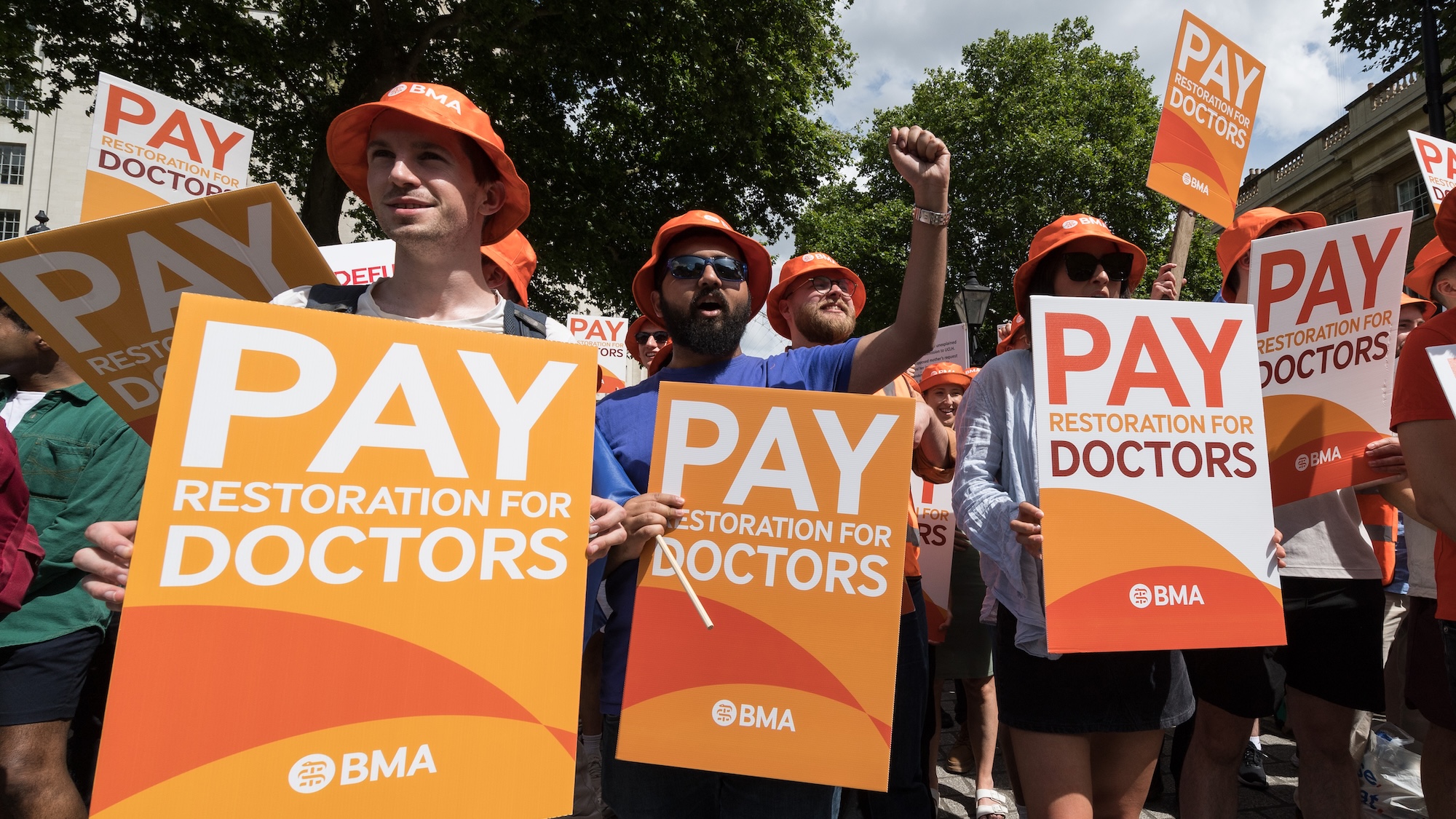Doctors' strikes: have the public run out of patience?
BMA confirms resident doctors will strike from Friday after government talks break down

A free daily email with the biggest news stories of the day – and the best features from TheWeek.com
You are now subscribed
Your newsletter sign-up was successful
Just five years on from "Clap for Carers", public support for resident doctors and their upcoming strikes is dwindling.
A YouGov poll published this week showed that public support for the strike "has dropped five points" since May, with 52% of the 4,954 adults surveyed opposed to the strikes, and 34% in favour.
The British Medical Association has confirmed that industrial action will begin on Friday over demands for a 29% pay rise. Discussions with the government appear to have completely broken down, with reported "fury inside the Department of Health and Social Care" over the BMA's decision not to postpone the strike for further talks, said The Guardian.
The Week
Escape your echo chamber. Get the facts behind the news, plus analysis from multiple perspectives.

Sign up for The Week's Free Newsletters
From our morning news briefing to a weekly Good News Newsletter, get the best of The Week delivered directly to your inbox.
From our morning news briefing to a weekly Good News Newsletter, get the best of The Week delivered directly to your inbox.
Resident doctors, formerly known as junior doctors, have demanded the pay increase because, they say, their salaries have been "eroded by inflation".
What did the commentators say?
Last year's doctors' strike had widespread public backing "despite the 1.3 million healthcare appointments lost", said Polly Toynbee in The Guardian. There was a "strong sense" that "this was about defending the state of the service". Now, with the NHS still "under intense strain" and in a world "where growth and pay have long stagnated", people may struggle to feel the same way.
We are seeing the NHS under threat after "finally getting back on its feet", said Kevin Maguire in The Mirror. Most of us agree that "hard-working, skilled and stressed life-savers are worth even more" than they're being paid, but further industrial action could end up "squandering bedside trust", as well as "respect".
In media appearances, the BMA has been "insufferable" and "self-righteous" over this, said consultant physician Druin Burch in The Spectator. Most resident doctors are "excellent" and hardly ever convey "the self-satisfaction seen in recent media calls for more money".
A free daily email with the biggest news stories of the day – and the best features from TheWeek.com
Most of them are young and struggling with economic squeezes but this has "little to do with the wages of junior or even senior doctors" and more to do with a "twisted housing market". Like many young people, they are "not slow to feel the world is treating them unfairly" but I see "no widespread conviction about these strikes".
Most people do not realise "how long it takes to become a specialist in the UK", said former NHS resident doctor Benyamin Deldar in the Financial Times. It can "easily" be "13 to 14 years post-graduation before you can work independently as a consultant" and earn more decent money.
What next?
A favourable outcome for the public would be "no strikes followed by an agreed independent review to improve earnings long-term", said The Mirror's Maguire. "Wages, jobs and lives are in the balance."
A solution like "pay rises for the first year or two", when resident doctor wages are at their lowest, could be affordable, said The Spectator's Burch, but "no serious government could accept a huge precedent-setting pay rise".
Richard Windsor is a freelance writer for The Week Digital. He began his journalism career writing about politics and sport while studying at the University of Southampton. He then worked across various football publications before specialising in cycling for almost nine years, covering major races including the Tour de France and interviewing some of the sport’s top riders. He led Cycling Weekly’s digital platforms as editor for seven of those years, helping to transform the publication into the UK’s largest cycling website. He now works as a freelance writer, editor and consultant.
-
 Local elections 2026: where are they and who is expected to win?
Local elections 2026: where are they and who is expected to win?The Explainer Labour is braced for heavy losses and U-turn on postponing some council elections hasn’t helped the party’s prospects
-
 6 of the world’s most accessible destinations
6 of the world’s most accessible destinationsThe Week Recommends Experience all of Berlin, Singapore and Sydney
-
 How the FCC’s ‘equal time’ rule works
How the FCC’s ‘equal time’ rule worksIn the Spotlight The law is at the heart of the Colbert-CBS conflict
-
 Growing a brain in the lab
Growing a brain in the labFeature It's a tiny version of a developing human cerebral cortex
-
 A real head scratcher: how scabies returned to the UK
A real head scratcher: how scabies returned to the UKThe Explainer The ‘Victorian-era’ condition is on the rise in the UK, and experts aren’t sure why
-
 Mixed nuts: RFK Jr.’s new nutrition guidelines receive uneven reviews
Mixed nuts: RFK Jr.’s new nutrition guidelines receive uneven reviewsTalking Points The guidelines emphasize red meat and full-fat dairy
-
 Trump HHS slashes advised child vaccinations
Trump HHS slashes advised child vaccinationsSpeed Read In a widely condemned move, the CDC will now recommend that children get vaccinated against 11 communicable diseases, not 17
-
 The truth about vitamin supplements
The truth about vitamin supplementsThe Explainer UK industry worth £559 million but scientific evidence of health benefits is ‘complicated’
-
 Health: Will Kennedy dismantle U.S. immunization policy?
Health: Will Kennedy dismantle U.S. immunization policy?Feature ‘America’s vaccine playbook is being rewritten by people who don’t believe in them’
-
 How dangerous is the ‘K’ strain super-flu?
How dangerous is the ‘K’ strain super-flu?The Explainer Surge in cases of new variant H3N2 flu in UK and around the world
-
 Choline: the ‘under-appreciated’ nutrient
Choline: the ‘under-appreciated’ nutrientThe Explainer Studies link choline levels to accelerated ageing, anxiety, memory function and more